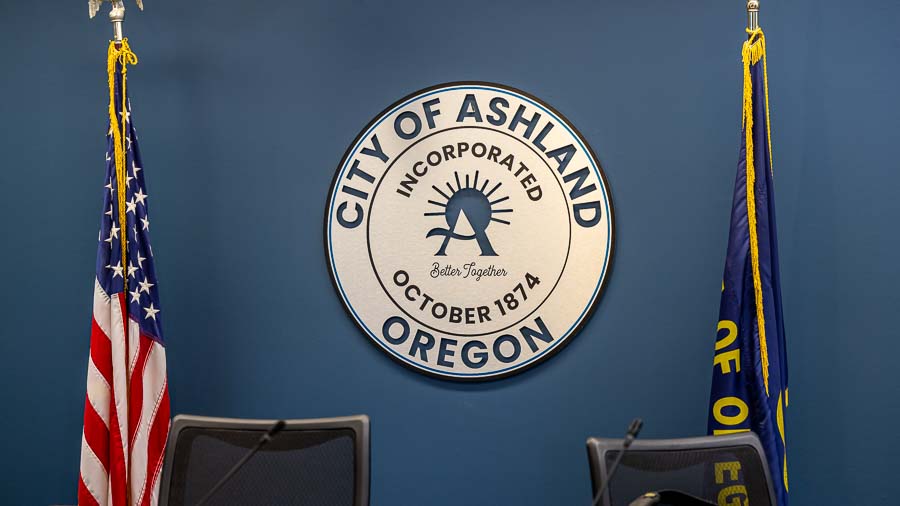Councilor Bloom opposes a measure to put proposed tax and fee hikes before Ashland voters, but he says councilors should put the measure on the ballot to foster public trust
A group of Ashland residents led by George Kramer is circulating a petition to put a measure on the ballot in 2026 that proposes to change the Ashland City Charter to require that any new tax or utility fee be subject to voter approval. The proposal will qualify for the ballot if enough valid voter signatures are submitted. The City Council could waive that requirement if it voted to advance the proposal to the ballot. Here, Councilor Dylan Bloom argues that councilors should advance the proposal to the ballot — and then makes the case against its passage. In an opposing Pros & Cons column, Councilor Jeff Dahle makes the case that petitioners should complete the process of collecting signatures to put the issue on the ballot.
By Councilor Dylan Bloom

Next November, Ashlanders may decide whether any new or increased utility fees must be approved by voters. I do not support that policy. But I do support the City Council placing the measure on the ballot rather than requiring the petitioner, George Kramer, to gather signatures.
Why? Because trust is the currency of local government, and ours has been depleted. During the last budget cycle, the council was presented with a package of fees as a way to fund important services. That discussion was compressed by the statutory deadline to pass a budget. As a result, many residents learned about the fees only after they were adopted. Soon after the budget passed, we also approved increases to management salaries while telling the public we were in a difficult financial position. Even if one believes each decision could be justified on its own terms, taken together they have eroded public trust.
If we want to advance the best ideas for Ashland, on public safety, wildfire resilience, infrastructure, housing and economic development, we first have to repair that trust. Referring this measure is an opportunity to do exactly that. It invites an open civic conversation rather than forcing a citizen to expend time and money just to get the question before voters. And it signals that the council is willing to listen.
Read an opposing view:
Councilor Jeff Dahle says council should not send City Charter proposal to voters but should let petition process play out.
Some will argue that putting the measure on the ballot implies support for its passage. At our last discussion on this topic, the mayor suggested that even a simple majority vote to refer could be read that way. I disagree. Referral is not endorsement. If a bare majority declines to refer, would that mean the entire council opposes the measure? Of course not. We are seven distinct representatives elected for different reasons. Our procedural vote to put a question to the people does not predetermine or homogenize our substantive views. I will be clear with voters: I intend to vote against the measure because I believe it would constrain this and future councils from responding quickly to emerging needs.
But I also believe voters deserve the chance to weigh that argument against the very real concerns about
process and transparency.
Others worry about precedent. If we place this on the ballot, are we obligated to refer every idea that any upset resident brings forward? No. Leadership requires judgment. We should evaluate each request on its merits: community salience, fiscal impact, legal clarity, timing and whether referral would meaningfully advance public understanding. This proposal meets that test. It is timely, widely discussed and goes to the core question of how Ashland raises and allocates revenue.
There is also a practical consideration. Mr. Kramer is likely to gather the required signatures. If the council declines to refer, the public will reasonably conclude that we tried to erect a procedural hurdle to a conversation they are determined to have. That will only deepen skepticism and, ironically, increase the chances that the measure passes. If we refer it ourselves, we take ownership of the process, we model transparency, and we create space to explain why tying the council’s hands on utility fees could jeopardize essential services and long-term stability.
To be clear, referral is the start of a conversation, not the end. Between now and next November, the city owes residents straightforward information: what existing fees fund, what guardrails already exist, what alternatives we have for paying for core services, and what risks the measure poses to our ability to act in emergencies or to match state and federal funding opportunities. We should welcome public forums, publish plain-language explanations and invite tough questions. That is how we rebuild confidence.
Ashland thrives when we argue in good faith and then let voters decide. Referring this measure demonstrates respect for that tradition. I will work hard to persuade the community that the policy itself is the wrong tool for a real problem. But the problem of trust in how we raise revenue demands that we meet residents where they are. Placing this question on the ballot is the responsible, transparent and democratic way to do it.
Contact City Councilor Dylan Bloom at [email protected]. Email letters to the editor and Viewpoint submissions to [email protected].

















